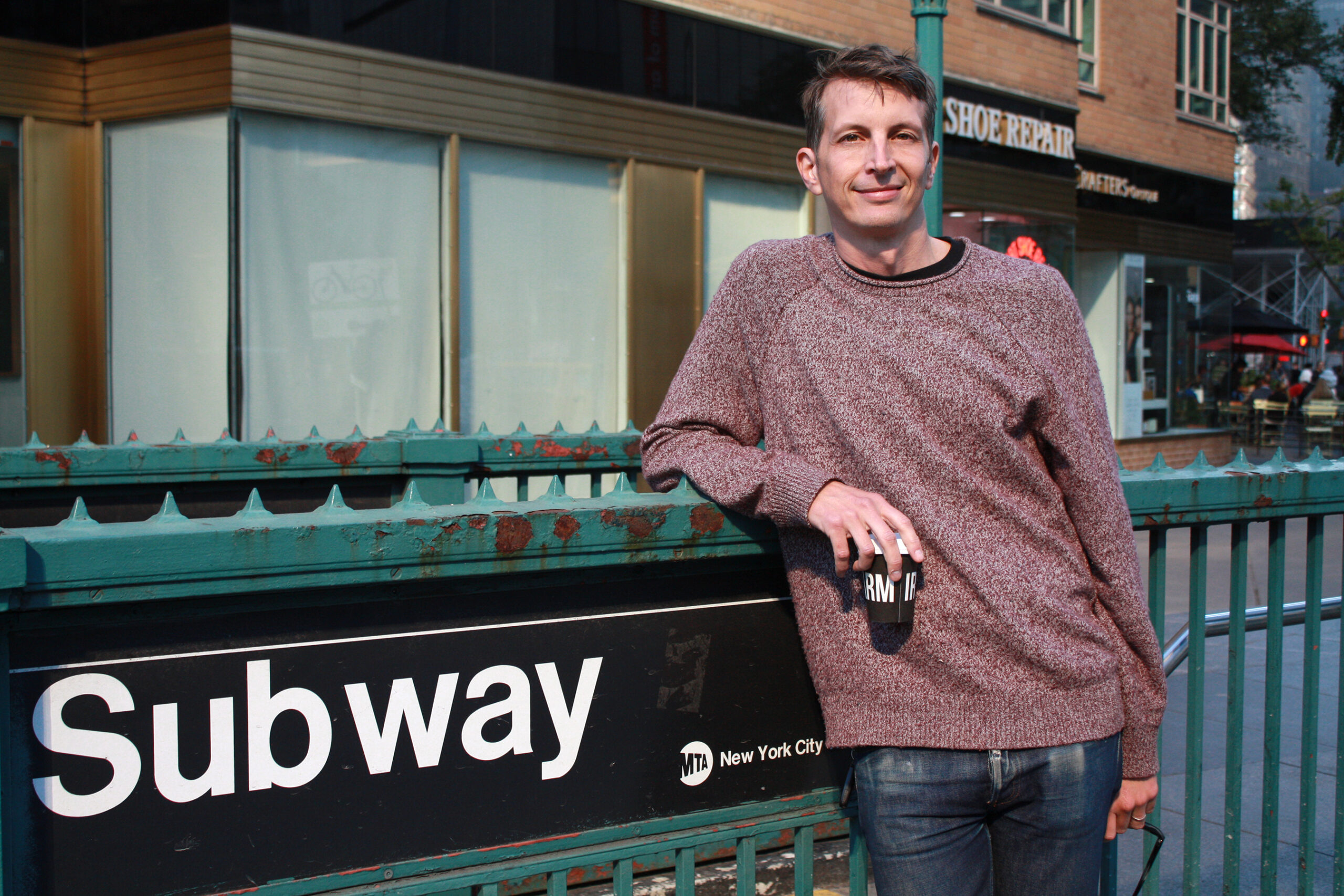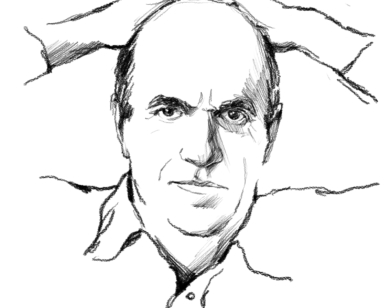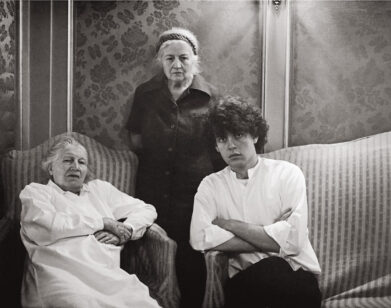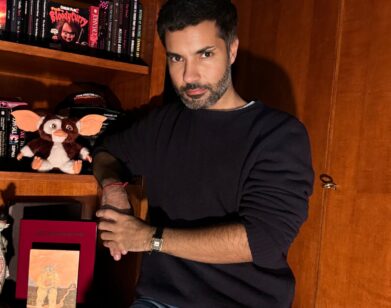LIT
“I Needed to Write About Addiction”: Garth Risk Hallberg, in Conversation With Tommy Orange
Garth Risk Hallberg’s second novel, aptly titled The Second Coming, begins in the Spring of 2011, with 13-year-old Jolie drunkenly searching for her iPhone on the subway tracks. Her near-miss leads to a reconnection with her estranged father and a reckoning with their relationship, a dynamic Hallberg writes from a place of keen emotional perception. Fiction, he explains, is “this incredibly plastic medium for rendering those movements between self and other.” And for Hallberg, whose sprawling 2015 debut City on Fire made him one of the most promising novelists of his generation (and earned him a then-record $2 million advance), it’s this plasticity that drew him towards writing in the first place. “It’s what fiction has over any other medium,” he explained to fellow writer Tommy Orange, who released his second novel, Wandering Stars, earlier this year. Hallberg and Orange’s connection began on WNYC, when Hallberg was struck by Orange’s assertion that he writes his characters “from the inside out rather than from the outside in.” In The Second Coming, Hallberg does just that. Before setting out on his book tour, Hallberg joined Orange to delve into their recent novels, addiction narratives, and their experiences, so far, of fatherhood.—JULIETTE JEFFERS
———
GARTH RISK HALLBERG: Tommy, what’s up?
TOMMY ORANGE: Oh, not too much. I’m just in a hotel in Wisconsin in the middle of the tour.
HALLBERG: How many hotel rooms have you stayed in at this point?
ORANGE: I don’t even know, it gets pretty blurry. I just came back from a little vacation, so I got a little break with my family last week.
HALLBERG: Was that restorative for you?
ORANGE: Yeah. But I’m a creature of habit, so I thrive on routine and the back-and-forth is super jarring. If things can just be normalized and stable, that’s where I do my best.
HALLBERG: How old are your kids?
ORANGE: I have a 13-year-old and an almost two-year-old. The almost two-year-old’s a handful, much different than his older brother. How about you?
HALLBERG: Well, I was asking because you had the childcare situation last time. I’ve got four. My oldest is 14 and my youngest just turned four, which is a lot. It’s great, I’ve got no complaints. But we did have a mysterious rash this morning on the four-year-old. I was like, “Am I going to have to cancel this or do we just watch Moana for the ten-thousandth time and just make it work?” But yeah, the touring thing is complicated with kids.
ORANGE: I just need a couple days. And if I know that I’m back home for long enough, then I can settle back in.
HALLBERG: I’m also totally a creature of habit, but I’m learning to develop routines. Writing is the big grounding thing for me, but I found that really challenging coming off tour–
ORANGE: And with four kids.
HALLBERG: Totally. And over the last five years, running has been really helpful to me because it’s not a concentrating thing. You’re just like, “My body’s going to go do this thing and I’m along for the ride.” The last time I did a tour, I was in husk form for six months afterwards, probably. But when I look back and I think about all the things that felt really terrible at the time, you get to a certain point in your life and you wouldn’t undo those things because then you would be in Back to the Future. Your whole present would be different. So even those bad pages in the early stages of something, I tend to look back and think, “I probably had to write that garbage.”
ORANGE: It’s true. And there’s also good pages on days you feel like complete garbage, and you find it later and you’re like, “Wow, I don’t know how that sentence happened on that kind of day.”
HALLBERG: I have an extraordinary capacity to convince myself that something’s really bad, even if it’s not. I wanted to ask you something about your writing, though. I feel like I read somewhere that you were a poet? Did I hallucinate that, or have you written poetry?
ORANGE: In a weird way, I was like an unconscious poet. The first writing that I did while I was in school for sound engineering were these soundscapes that were very much closer to poetry than anything else. But I would never have called myself a poet. Now, looking back, knowing what that writing was, that was the beginning of exploring language. That wasn’t until I was 22, and I wasn’t doing any writing before that. Do you have a background at all in poetry?
HALLBERG: Well, I do a little bit. I asked for a couple of reasons. One is that, when I read your work, I feel like you have this relationship with language that feels very proximate to music. It’s as though what you’re trying to do with language is to make room for something to sing through you, whereas a lot of contemporary fiction writing I read feels a little more technocratic. Within a sentence, I can feel you listening to where the sentence wants to go rather than trying to drive it in some particular direction.
ORANGE: Thank you. I didn’t really start thinking that that’s what I was doing until after I wrote There There, and I leaned a little more into it once I knew I was doing it with Wandering Stars. There’s a certain school of writing out there that’s very anti-interiority, with a heavy emphasis on scene work. I think that’s a big part of teaching writing, like, “Where’s the scene? Where’s the scene?” Which I think is probably good advice 80% of the time, but my whole love of fiction has to do with consciousness and the weirdness of the inside that can’t get explored anywhere else. You do this on a granular level across your work, but can you talk about how you deal with the balance of interiority versus exteriority, and also the challenges of the second book?
HALLBERG: The inside-out thing, that’s a deep place where I feel this resonance with your work because that’s so important to me as a writer. I think the reason it’s important has something to do with how we experience life and how you move through the world. You’re not experiencing your life as a Wikipedia entry where everything is clearly labeled. You’re just moving through moods and feelings and scenes, like you said. I feel like we’re constantly bombarded with this picture of how we’re living our lives, like on Instagram or something, that’s from the outside in. In fact, I know people who will scroll the gram and be like, “This person’s life must feel amazing.” So I’m always gravitating towards stories that somehow challenge the outside picture of what something looks like. In the case of this book, I already had this gem of a story. But apparently, I needed to write about addiction and broken families and struggles with mental health stuff. Those were the things that were trying to sing through me. The real challenge for the book was that I wanted very high fidelity to my sense of how those things felt on the inside. From the first chapter, I had a rule. I was like, “I cannot write a sentence that just says, ‘This girl is depressed.’” But from the inside out, what that feels like is as though a sheet of glass has come down over the universe.
ORANGE: Totally. I want to get to Jolie, and this starting point of being slightly drunk in a Buddhist meditation group. I love this so much and I think it even resonates with one of my characters, Charles, who, while hungover, likes to go to church and hear people talk about god. Can you tell me where this came from? Because this is a beautiful way to come at this character. I think both of our books have this curiosity about addiction that leads into darker realms that addiction narratives don’t always emphasize.
HALLBERG: Exactly. Those narratives are really important and they help people. But the curiosity element that you pointed to, I feel it so strongly in what you’re doing as well. It’s related, in some weird way, to what I’ve been able to get out of Buddhism. Jolie is the intersection of three things. One thing is that she’s 13 and she’s drinking secretly, and that’s an experience I knew. The sentence where I knew I had the book is, “She’s sitting in this Zendo trying to meditate, but not really doing a very good job in part ’cause she’s a little drunk.” The thought of a 13-year-old being curious enough to explore something spiritual while also needing to get there faster by getting drunk, that was me. And then, the third thing is that she’s listening to Prince. So the triangulation of Prince and a drunken 13-year-old in a Zendo, I was like, “Okay, I know this girl and I’ve got this book.”
ORANGE: There’s another triangulation happening in the book, which is Jolie, Ethan, and Sarah, and the story gets told with them at the core. Was that always the case? And as a follow-up question, you also write a lot of other POVs. Do people complain like, “Why did you write so many characters? You’re confusing me.”
HALLBERG: You sound like someone who’s experienced those questions yourself.
ORANGE Well, life is much more like a sprawling book full of POVs than it is a singular narrative that you follow in a linear way, right?
HALLBERG: Yeah. There’s this generational way in which the story belongs to the youngest generation, in the same way that when you have kids you realize like, “Oh, shit. This isn’t my story anymore. I’m just a supporting character and someone else is the star.” That’s how it looks from the outside, but from the inside it doesn’t feel like that. It’s everybody’s story, and it’s often not quite clear whose story it is. You don’t have total access to other people, but you’re also not as locked out as it would be comfortable to think that you are. It’s what fiction has over any other medium. It is this incredibly plastic medium for rendering those movements between self and other.
ORANGE: I love being able to talk to you about fiction in this way. I would love to hear a little bit about this decision to have Ethan write letters to Jolie in this way that works beautifully. He’s reflecting on his descent into addiction, but that’s not why he’s telling her what’s going on. He’s also filling her in and the reader in on this part of his life that was this pivotal point, the opposite of a superhero origin story, but the origin story of the addict.
HALLBERG: Well, you have this line in Wandering Stars. “I didn’t think stories were made to comfort. I believe what my father told me, stories do more than comfort. They take you away and bring you back better made.” And I feel like there’s a deep insight there on your part. I wonder if you could talk a little bit about what story and storytelling and the ability to tell one’s story means in your books and then I’ll circle back around, ’cause it’s directly relevant to what you were saying about recovery and addiction narratives.
ORANGE: Storytelling, for me, weirdly came out of this experience of doing work for years in the native community. All across the U.S., there is a nonprofit that works with marginalized groups of people who don’t often get heard, using something called “digital storytelling.” It almost sounds archaic now, as a medium. It started out as this cutting-edge way to tell stories as we were really moving into the internet. The way that we did it was this three-day workshop with non-writers, and you’re teaching these people how to tell their stories and then turn them into short films. The first day you get in a circle and you tell the story just straight from your heart. Then, at the end of that day, you start turning the narrative that you told in the circle into a script. You go from telling the story to writing the story. And 90% of the time, because these are mostly non-writers, they haven’t really thought about how to translate voice into writing. They’ve only heard the way you write an essay in school, which is this formulaic, very technical version of what writing is. We already do it beautifully in our own voice, but when we go to write, it’s completely mangled by this institutionalized way of thinking about what writing is supposed to be. That’s where it started for me. Obviously, in There There, I have this storytelling structure: one of the characters is trying to collect all these stories from Oakland and that’s like, this meta-layer for how the book itself is formed. When I got into this lineage work with Wandering Stars, though, it became about the importance of the ways we influence the next generations in what we’re able to say.
HALLBERG: And it’s not just in Wandering Stars; it’s all over There There as well. You have a group of people whose stories, for historic reasons, have been mutilated. What you show is that there’s the trauma itself, for example, the historic massacre that you start Wandering Stars with. There’s a heritability to that. You’re the descendant of that trauma and you’re carrying that, but there’s a secondary thing of being cut off from the story of it, and that is really difficult. That basically is Jolie’s experience in The Second Coming. Her dad, due to pseudo-recovery, disappeared from her life and she doesn’t really know where she comes from. So even though she’s a white girl in New York and it doesn’t have the same historical freight, there is still the experience of, “I can’t figure out who I am at 13 or 14 because I’m left with gaps and lies and half-truths about who my parents were and who my grandparents were.” I think what both books suggest is that this is really, really damaging. So storytelling can be very healing, it can be very generative, it can be very orienting in terms of figuring out who you are and where you want to go. But the flip side, when you’re writing a book that deals so heavily in addiction, is that storytelling can also be lies, myths, falsehoods. To answer your long-ago question, Ethan’s letters were a way for me to explore that. I wanted to dramatize him actually finding his authentic way of telling the story truthfully by realizing who’s in the room with him listening to it, which is not someone he’s trying to impress, not somebody he’s trying to get over on, but his daughter.
ORANGE: And the urgency of that is perfect. That’s why it fits so well. I also wanted to talk about the way Jolie uses silence against her dad in this longish section where she just completely ices him out. The way it creates this massive tension in the book is beautifully done. Could you talk a little bit about where that came from?
HALLBERG: I think there’s something related to power dynamics. If you’re in a dynamic like a child and a parent, and you just inherently have less power, somehow you can scream and scream and no one listens to you, it just gets written off. There’s almost something gendered about it with respect to Ethan. I feel like he talks and talks and Jolie, in order to be loud, has to be silent. I’m very close to someone who actually had to cut their parents off. But what I observed was that there is no such thing as silence. The silence makes a statement. This was a very fraught dynamic that I didn’t know how else to understand but by writing about it. And if I think about it in the context of my own kids, I can see how that would be very painful for a parent.
ORANGE: We’re both heading into the teenage years, and I think there’s the fear that everything you may have done wrong could turn into this monster that is your beloved child.
HALLBERG: Do you have that fear? I don’t want to impute anything to you, but I was very moved by how artfully and deftly you handled questions about how personal some of the stuff in Wandering Stars is to you. I found that my fear is less about all the mistakes I’ve made as a parent producing all this fallout. My fears are more like, “When you hit the age that I was when these things happened to me, are you going to have to go through the same things?” I would do almost anything to prevent that from happening. Does that resonate with you?
ORANGE: Yeah, absolutely. I got some advice a long time ago from this Lakota healer woman whose family goes way back in Oakland. And it has to do with remembering that if you keep showing up consistently, that is going to be the more important element than the singular mistakes that you might see in your own mind as too massive to overcome. That was really good advice for me to remember in the darker moments of worry. But you said something that I want to talk about briefly. It’s an interesting thing as a fiction writer when you’re going through the interview and public-facing part of putting a book out. With There There, I went out as a completely open book. I didn’t have any safeguards and I was just like, “This is who I am.” I wrote personally in both books, but there’s something much closer in Wandering Stars, so I’m having to learn how to do it a different way this time. You want to be honest, and that’s part of why people want to talk to the author, but people can be really intrusive and we never end up talking about the fiction if all you want to hear is, “How real is all this stuff?'” I didn’t write a memoir. I wrote fiction. And there’s more fiction in it than there is realness. The real stuff is where the emotions come from. I’m wondering if you’re worried about that part of the tour.
HALLBERG: Dude, I’m terrified. With the last book, I was guarded. I was trying to be very generous with who I am as a person, but my dad had just died and it was a really messy time. I’m going to have to figure out a way to be more comfortable answering these questions, which is why this is a really great interview to kick things off ’cause I feel very comfortable with you as a friend who I know from the page.
ORANGE: Well, let’s keep in touch. I remember the weeks leading up were the scariest part.







